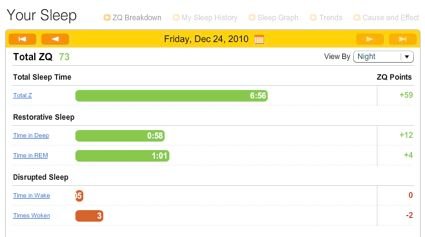I have always resented sleep. What a waste of time. I’ve never been an insomniac, exactly, because when I finally gave in at night and went to bed, I’d fall asleep quickly. But when I’d wake up at 3 a.m. I often could not stand lying there, knowing how much good stuff I had to read in my study, or maybe some writing to do or a check-in with Twitter, which never sleeps. Then came Zeo.
At Podcamp Boston 5 three months ago I met Stephen Fabregas, a reseach scientist who works at Zeo, Inc., a Boston-area startup founded by a group of sleep-deprived students at Brown University. He made the pitch over lunch, and I was hooked. I love gadgets, and this one promised to reveal secrets of my own sleep patterns. It seemed weird at first, like hearing what they say at your funeral, to see what’s happening in the brain when it clicks off. How much deep sleep, how much Rapid Eye Movement (REM) sleep? For $199, I was eager to find out.
As you can see from the photo, the device, called a Personal Sleep Coach, looks like a digital alarm clock. It comes with a band you wear around your head when you sleep, which is awkward at first, but the design is high-end for comfort and even a kind of night-geek style. Something in the band transmits information from your head to the base. It tracks when you fall into sleep, and it segments your sleep into light, deep and REM. It knows when you wake up, even briefly, and in the morning you take the band off and return it to its charging dock at the top of the device.
 Then comes the moment I anticipate every morning. I check the screen to see a number called the ZQ, a composite sleep score that takes into account the hours slept and the quality, with minus points for the times and duration of being awake. Last night here in Omaha, on our visit with Darlene’s sister Deb, I had a new personal best, a ZQ of 76. Unfortunately, the information for some reason didn’t make it into my online Zeo database with the SD card, so the illustration here is from Christmas Eve, when my ZQ was a respectable 73. The average for someone in their 60s is 62, and that’s my average for the last seven nights.
Then comes the moment I anticipate every morning. I check the screen to see a number called the ZQ, a composite sleep score that takes into account the hours slept and the quality, with minus points for the times and duration of being awake. Last night here in Omaha, on our visit with Darlene’s sister Deb, I had a new personal best, a ZQ of 76. Unfortunately, the information for some reason didn’t make it into my online Zeo database with the SD card, so the illustration here is from Christmas Eve, when my ZQ was a respectable 73. The average for someone in their 60s is 62, and that’s my average for the last seven nights.
If there is one thing Darlene doesn’t need help doing, is sleep. But she’s gotten into my Zeo experience and often wakes up asking “What was your score?” Self-interest may be involved, because if my score is in the 40s she knows I’m not going to be of much use till I recharge my mind and body with a nap. I don’t share well, so I’ve never given up a night of data so she could try the Zeo. Instead, I bought her a device for Christmas, and she tried it last night for the first time. I think the band must have slipped out of place, because in the morning there wasn’t enough data to provide a score. I fully expect her ZQ to be in the 90s, given how long and well she sleeps.
“The more you know, the better you sleep,” is how Zeo puts it in their messaging. It’s brilliant, and in my case it’s clearly working. I’m a fairly competitive fellow, so if you give me a score for something, I’ll try to improve on it. This means that in the past three months I’ve been more likely to stay in bed at 3 a.m. for a while longer before giving up and heading quietly for my studio. And I’m doing a better job of disengaging from the computer an hour before bedtime and reading restful fiction. Also, no coffee after 3 p.m. All these factors are highlighted in the Zeo information at the colorful and well-organized web site. There are lots of different graphs and charts you can generate to see the fine points of your sleep. Deep sleep shows up as a dark, restful green bar, and you know it’s good for you, just by the color. I want more of it.
Zeo is using the power of social networking, so if you click here to buy one, you’ll get $15 off with free shipping and I’ll get an incentive payment. Pretty neat, but the real story here is I’m having fun learning about my sleep patterns, and I don’t resent sleep the way I used to. After a night of decent sleep, it’s amazing how much better the world works.

